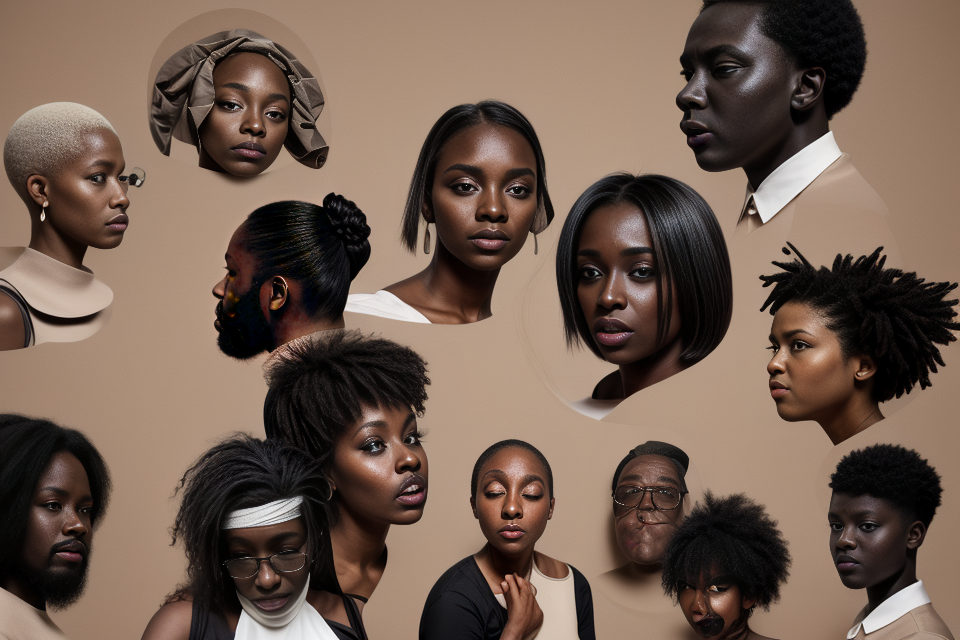Dark skin, often referred to as melanin-rich skin, has been a topic of interest for centuries. It is characterized by its deep brown color and is often associated with beauty and a healthy complexion. However, the advantages and disadvantages of dark skin are not always clear. Some people believe that dark skin is better than light skin, while others believe the opposite. In this article, we will explore the advantages and disadvantages of dark skin and provide a comprehensive analysis of this topic. We will delve into the biological, cultural, and social aspects of dark skin and provide a balanced perspective on this controversial issue.
The advantages of dark skin include increased protection from the sun’s harmful ultraviolet rays, a more youthful appearance due to reduced signs of aging, and a boost in self-esteem for some individuals. However, the disadvantages of dark skin include a higher risk of certain skin conditions such as melanoma, hyperpigmentation, and acne. Additionally, individuals with dark skin may experience discrimination and prejudice based on their skin color. It is important to note that skin color is not indicative of any inherent characteristics or abilities, and that all skin colors are beautiful and unique.
Understanding Dark Skin
Definition of Dark Skin
Dark skin is generally defined as a complexion that appears darker than average due to higher levels of melanin in the skin. Melanin is a pigment that determines the color of our skin, hair, and eyes. It is produced by cells called melanocytes, which are located in the epidermis, the outer layer of the skin.
Dark skin comes in a variety of shades, ranging from deep brown to black. These shades can be influenced by a number of factors, including genetics, sun exposure, and environmental factors. For example, people with African ancestry tend to have darker skin, while people with European ancestry tend to have lighter skin.
It is important to note that the definition of dark skin can vary depending on cultural and societal norms. In some cultures, dark skin is considered desirable, while in others it may be seen as undesirable or even undesirable. Additionally, the term “dark skin” should not be used as a catch-all term for people of color, as there is a wide range of skin tones within each racial and ethnic group.
Causes of Dark Skin
Dark skin is caused by a combination of genetic, environmental, and evolutionary factors. The melanin pigment in the skin is responsible for its color, and an increase in melanin production leads to darker skin tones.
Genetic Factors
Genetics play a significant role in determining the amount of melanin produced by an individual’s skin. People with ancestry from regions with high levels of sun exposure, such as Africa and India, tend to have higher levels of melanin in their skin, resulting in darker skin tones. The inheritance of melanin-related genes from parents also influences the skin color of individuals.
Environmental Factors
Exposure to sunlight is a significant factor in the production of melanin, and therefore, individuals who live in areas with high levels of sun exposure tend to have darker skin tones. Prolonged exposure to the sun’s ultraviolet (UV) rays triggers the production of melanin, which helps protect the skin from the harmful effects of UV radiation. However, excessive exposure to the sun can also lead to skin damage and other health problems.
Evolutionary Reasons
The evolution of dark skin is believed to have been a response to the need for protection against the harmful effects of UV radiation. In ancient times, humans living in regions with high levels of sun exposure had a selective advantage if they had darker skin, as it provided better protection against skin damage and skin cancer. This is why people with ancestry from these regions tend to have darker skin tones.
Advantages of Dark Skin
Appearance
Dark skin has been shown to have a number of advantages in terms of appearance. Some of these advantages include:
- Enhanced attractiveness: Studies have shown that people with darker skin tones are often perceived as more attractive than those with lighter skin tones. This may be due to a number of factors, including the fact that darker skin is often associated with youth and health.
- Radiant and youthful look: Dark skin has a natural glow and can give the appearance of being more radiant and youthful than lighter skin. This is because dark skin contains more melanin, which helps to protect the skin from damage caused by the sun and can give the skin a more even tone.
Additionally, dark skin is often associated with a number of positive qualities, such as strength, intelligence, and beauty. This can help to boost confidence and self-esteem in individuals with dark skin.
It is important to note, however, that beauty standards are subjective and can vary greatly from one culture to another. While dark skin may be perceived as attractive in some cultures, it may not be viewed in the same way in others.
Protection
One of the main advantages of having dark skin is the protection it offers against the harmful effects of ultraviolet (UV) rays. Dark skin contains more melanin, a pigment that acts as a natural sunscreen, protecting the skin from the sun’s damaging rays. This high melanin content helps to absorb UV rays, reducing the risk of skin damage and skin cancer.
Moreover, people with dark skin are less likely to experience sunburn, which can cause skin damage and premature aging. Dark skin also has a higher ability to repair itself from UV damage, as it has a higher number of melanocytes, the cells responsible for producing melanin. This means that people with dark skin are less likely to develop age spots, wrinkles, and other signs of aging caused by UV damage.
However, it is important to note that while dark skin provides excellent protection against UV rays, it is still essential to practice sun safety measures, such as wearing sunscreen and avoiding prolonged exposure to the sun, to prevent other forms of skin damage and skin cancer.
Cultural significance
Dark skin has been a symbol of beauty and strength in many cultures throughout history. This has led to a rich cultural heritage associated with dark skin, which is still celebrated today.
One of the key aspects of the cultural significance of dark skin is its association with beauty. In many cultures, dark skin has been considered more attractive than lighter skin, and this has been reflected in art, literature, and popular culture. For example, in ancient Egypt, it was common for people to be depicted with dark skin, and this was seen as a sign of beauty and nobility. Similarly, in modern-day Africa, dark skin is often seen as a symbol of beauty and elegance.
In addition to its association with beauty, dark skin has also been linked to strength and resilience. In many cultures, people with dark skin were seen as being stronger and more resilient than those with lighter skin. This was often linked to the idea that people with dark skin were better able to withstand the harsh conditions of the sun and the elements. This association with strength and resilience has been passed down through generations, and is still celebrated today.
Finally, the cultural significance of dark skin is also tied to its rich heritage. Many cultures have a long and proud history of dark-skinned people, and this has been reflected in the arts, literature, and music of these cultures. For example, in African music, the drum is often used to celebrate the beauty and strength of dark-skinned people, and this has become an important part of African culture. Similarly, in Latin American cultures, dark-skinned people have been celebrated in literature and art, and this has helped to preserve the rich cultural heritage of these cultures.
Disadvantages of Dark Skin
Hyperpigmentation
Hyperpigmentation is a condition that occurs when the skin produces excess melanin, resulting in dark patches or spots on the skin. These patches can be unsightly and can affect a person’s self-esteem and confidence.
There are several causes of hyperpigmentation, including sun damage, hormonal changes, and certain medications. Treatment options include topical creams, chemical peels, and laser therapy. It is important to consult a dermatologist to determine the best course of treatment for your specific condition.
Hyperpigmentation can also be caused by certain medical conditions, such as Addison’s disease, which affects the adrenal glands and can lead to a decrease in the production of melanin. In these cases, treating the underlying condition is necessary to address the hyperpigmentation.
It is important to note that while hyperpigmentation can be a cosmetic concern, it is not a serious medical condition. However, it is important to address the condition in order to improve one’s appearance and self-esteem.
Skin cancer
Dark skin is generally considered to be less susceptible to skin cancer than lighter skin. However, this does not mean that individuals with dark skin are completely immune to the disease. Dark-skinned individuals can still develop skin cancer, although it is less common.
The risk factors for skin cancer in dark-skinned individuals are similar to those in lighter-skinned individuals. Exposure to UV radiation from the sun or tanning beds, a history of sunburns, and a family history of skin cancer are all risk factors. Additionally, certain genetic conditions, such as albinism, can increase the risk of skin cancer in individuals with dark skin.
Prevention and early detection are key in reducing the risk of skin cancer in dark-skinned individuals. This includes limiting sun exposure, especially during peak hours, wearing protective clothing and sunscreen, and conducting regular self-examinations for unusual moles or lesions. It is also important to see a dermatologist for regular skin examinations, especially if there is a family history of skin cancer or other risk factors are present.
In conclusion, while dark skin does offer some protection against skin cancer, it is still possible for individuals with dark skin to develop the disease. It is important to take steps to prevent and detect skin cancer early, regardless of skin color.
Skin care challenges
Dryness and flakiness
Dark skin can be prone to dryness and flakiness due to its natural oils not being able to effectively hydrate the skin. This can lead to discomfort and itching, and may also make the skin more susceptible to other skin conditions such as eczema and psoriasis.
Sensitivity to certain products
Dark skin can also be more sensitive to certain skincare products, particularly those containing harsh chemicals or fragrances. This can cause irritation, redness, and other skin reactions, and may also make it more difficult to find suitable products for your skin type.
It is important to choose skincare products that are specifically formulated for dark skin, and to avoid using products that contain ingredients known to be irritating or drying to the skin. Additionally, it can be helpful to do a patch test on a small area of skin before using a new product to ensure that it does not cause any adverse reactions.
Tips for maintaining healthy skin
To maintain healthy skin as a person with dark skin, it is important to follow a consistent skincare routine that includes gentle cleansing, hydrating, and protecting the skin from the sun. Additionally, incorporating ingredients such as vitamin E and vitamin C into your skincare routine can help to nourish and protect the skin.
It is also important to pay attention to your diet and lifestyle, as certain nutrients and habits can affect the health and appearance of your skin. Eating a balanced diet that includes plenty of fruits, vegetables, and other nutrient-rich foods can help to keep your skin looking its best.
In addition, avoiding habits such as smoking and excessive alcohol consumption can help to promote healthy skin by reducing inflammation and protecting the skin from damage. By taking care of your skin from the inside out, you can help to maintain a healthy, glowing complexion.
FAQs
1. What is the advantage of having dark skin?
Dark skin has several advantages. One of the most significant advantages is that it provides better protection against the sun’s harmful ultraviolet (UV) rays. The melanin in dark skin absorbs UV rays, which helps to prevent damage to the skin and reduces the risk of skin cancer. Dark skin also has a built-in sunscreen, which means that people with dark skin do not need to use as much sunscreen as those with lighter skin.
2. What are the disadvantages of having dark skin?
One of the main disadvantages of having dark skin is that it is more prone to sun damage and skin cancer. Although dark skin provides better protection against UV rays, it is still susceptible to damage from prolonged sun exposure. This means that people with dark skin should take extra care to protect their skin from the sun, such as wearing sunscreen and avoiding prolonged exposure to direct sunlight.
3. Is dark skin more prone to wrinkles?
No, dark skin is not more prone to wrinkles than lighter skin. In fact, studies have shown that people with dark skin tend to have fewer wrinkles and age spots than those with lighter skin. This is because the melanin in dark skin helps to protect the skin from damage caused by the sun, which can lead to premature aging.
4. Does dark skin age differently than lighter skin?
Yes, dark skin ages differently than lighter skin. People with dark skin tend to have fewer wrinkles and age spots than those with lighter skin, but they may experience more hyperpigmentation. Hyperpigmentation is a condition where patches of skin become darker than the surrounding area. This can be caused by sun damage, hormonal changes, or certain medications.
5. Is dark skin more prone to acne?
No, dark skin is not more prone to acne than lighter skin. Acne is caused by a combination of genetic and environmental factors, such as hormonal changes, diet, and stress. While people with dark skin may be more prone to certain types of acne, such as cystic acne, this is not exclusive to dark skin.



